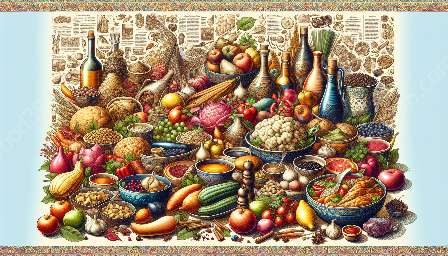The origins of agriculture in Mesopotamia represent a significant turning point in human history, with profound implications for the development of food cultures. This topic cluster will explore the early agricultural practices in Mesopotamia and how they contributed to the evolution of food culture.
Early Agricultural Practices in Mesopotamia
Mesopotamia, often referred to as the cradle of civilization, witnessed the emergence of agriculture around 10,000 BCE. The fertile soil and the predictable flooding of the Tigris and Euphrates rivers created an ideal environment for early farming practices. The Sumerians, one of the earliest known civilizations in Mesopotamia, developed sophisticated irrigation systems to harness the power of the rivers and cultivate crops such as barley, wheat, and date palms.
The introduction of basic agricultural tools, such as the plow and sickle, enabled the ancient Mesopotamians to till the land more efficiently and increase productivity. This transition from a hunter-gatherer lifestyle to settled agricultural communities laid the foundation for the development of food cultures in the region.
Development of Food Cultures in Mesopotamia
The shift towards agriculture in Mesopotamia led to the establishment of permanent settlements and the rise of urban centers. As surplus food production became possible, specialization in various crafts and trades emerged, giving rise to a more complex and stratified society.
The cultivation of crops and domestication of animals not only provided sustenance but also contributed to the emergence of food cultures characterized by culinary practices, food preservation techniques, and the development of distinctive cuisines. The trade networks that connected Mesopotamia with other civilizations allowed for the exchange of foodstuffs, spices, and culinary knowledge, leading to the enrichment and diversification of food cultures.
The practice of brewing beer from barley and the use of various herbs and spices in cooking became an integral part of Mesopotamian food culture. Food was not only a means of nourishment but also carried symbolic and social significance, as communal feasts, religious rituals, and offerings played a central role in the cultural life of ancient Mesopotamians.
Origin and Evolution of Food Culture
The origins of agriculture in Mesopotamia had a profound impact on the evolution of food culture globally. The development of food preservation techniques, such as drying, salting, and fermentation, allowed for the storage and transport of food across long distances, contributing to the exchange of culinary traditions and the fusion of different food cultures.
As civilizations expanded and interacted through trade, conquest, and migration, the influence of Mesopotamian food culture spread to neighboring regions and beyond, shaping the culinary practices of future societies. The Babylonians, Assyrians, and Akkadians, who succeeded the Sumerians, further refined agricultural and culinary practices, leaving a lasting imprint on the food cultures of the ancient Near East.
Ultimately, the origins of agriculture in Mesopotamia paved the way for a transformative shift in human societies, from nomadic hunter-gatherers to settled agricultural communities, giving rise to food cultures that continue to evolve and shape culinary traditions to this day.


